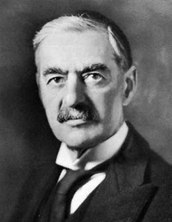Neville Chamberlain (18 Mar. 1869 - 9 Nov. 1940)

Chamberlain was Prime Minister when the war began in 1939. Before then he is famous for signing the Munich Agreement, allowing Germany to annex the Sudetenland of Czechoslovakia. He famously announced “peace in our time”. His appeasement policies became increasingly unpopular with the British Members of Parliament. His delays following the German invasion of Poland in September 1939 drew further criticism.
When war was announced, Chamberlain assembled a War Cabinet, and appointed Churchill First Lord of the Admiralty. He also invited colleagues from other parties, Liberal and Labour to join the government, however they refused. The war, nicknamed the Phoney War, was, to Chamberlain, winnable if Britain kept pressure on Germany economically, through blockades and embargoes. Rearmament continued in Britain, meanwhile.
In early 1940, Churchill’s plan to seize Narvik, Norway, was approved by the Allies. It came too late, however, as Hitler had sent an invasion into Norway already. Allied attempts to fight the Germans there quickly failed. This failure was catastrophic for Chamberlain and, although he survived a vote of no-confidence, it was impossible for him to maintain the premiership without support from the Labour Party. When it became clear that Labour could not work with Chamberlain, he resigned on 10 May 1940. When he resigned to the King, he advised him to send for Churchill, who he believed would be a strong enough leader to run a unity government. Churchill later wrote to Chamberlain, expressing gratitude for this.
After his departure he became Lord President of the Council in the War Cabinet. He was still very influential in the meetings he chaired, including the War Cabinet when Churchill was unavailable. Whilst working, Chamberlain fell ill, and was found to be suffering from bowel cancer in July 1940. In September he resigned for health reasons, and died 9 November 1940. His importance to the war effort following his resignation as Prime Minister was still important, and is seen in this non-public admission from Churchill, “Whatever shall I do without poor Neville? I was relying on him to look after the Home Front for me.”
For more information on Neville Chamberlain:
Lee, J.M. The Churchill Coalition, 1940 - 1945. (London: Batsford Academic and Educational), 1980.
Self, Robert C. Neville Chamberlain, A Biography (Aldershot, Ashgate), 2006.
When war was announced, Chamberlain assembled a War Cabinet, and appointed Churchill First Lord of the Admiralty. He also invited colleagues from other parties, Liberal and Labour to join the government, however they refused. The war, nicknamed the Phoney War, was, to Chamberlain, winnable if Britain kept pressure on Germany economically, through blockades and embargoes. Rearmament continued in Britain, meanwhile.
In early 1940, Churchill’s plan to seize Narvik, Norway, was approved by the Allies. It came too late, however, as Hitler had sent an invasion into Norway already. Allied attempts to fight the Germans there quickly failed. This failure was catastrophic for Chamberlain and, although he survived a vote of no-confidence, it was impossible for him to maintain the premiership without support from the Labour Party. When it became clear that Labour could not work with Chamberlain, he resigned on 10 May 1940. When he resigned to the King, he advised him to send for Churchill, who he believed would be a strong enough leader to run a unity government. Churchill later wrote to Chamberlain, expressing gratitude for this.
After his departure he became Lord President of the Council in the War Cabinet. He was still very influential in the meetings he chaired, including the War Cabinet when Churchill was unavailable. Whilst working, Chamberlain fell ill, and was found to be suffering from bowel cancer in July 1940. In September he resigned for health reasons, and died 9 November 1940. His importance to the war effort following his resignation as Prime Minister was still important, and is seen in this non-public admission from Churchill, “Whatever shall I do without poor Neville? I was relying on him to look after the Home Front for me.”
For more information on Neville Chamberlain:
Lee, J.M. The Churchill Coalition, 1940 - 1945. (London: Batsford Academic and Educational), 1980.
Self, Robert C. Neville Chamberlain, A Biography (Aldershot, Ashgate), 2006.

